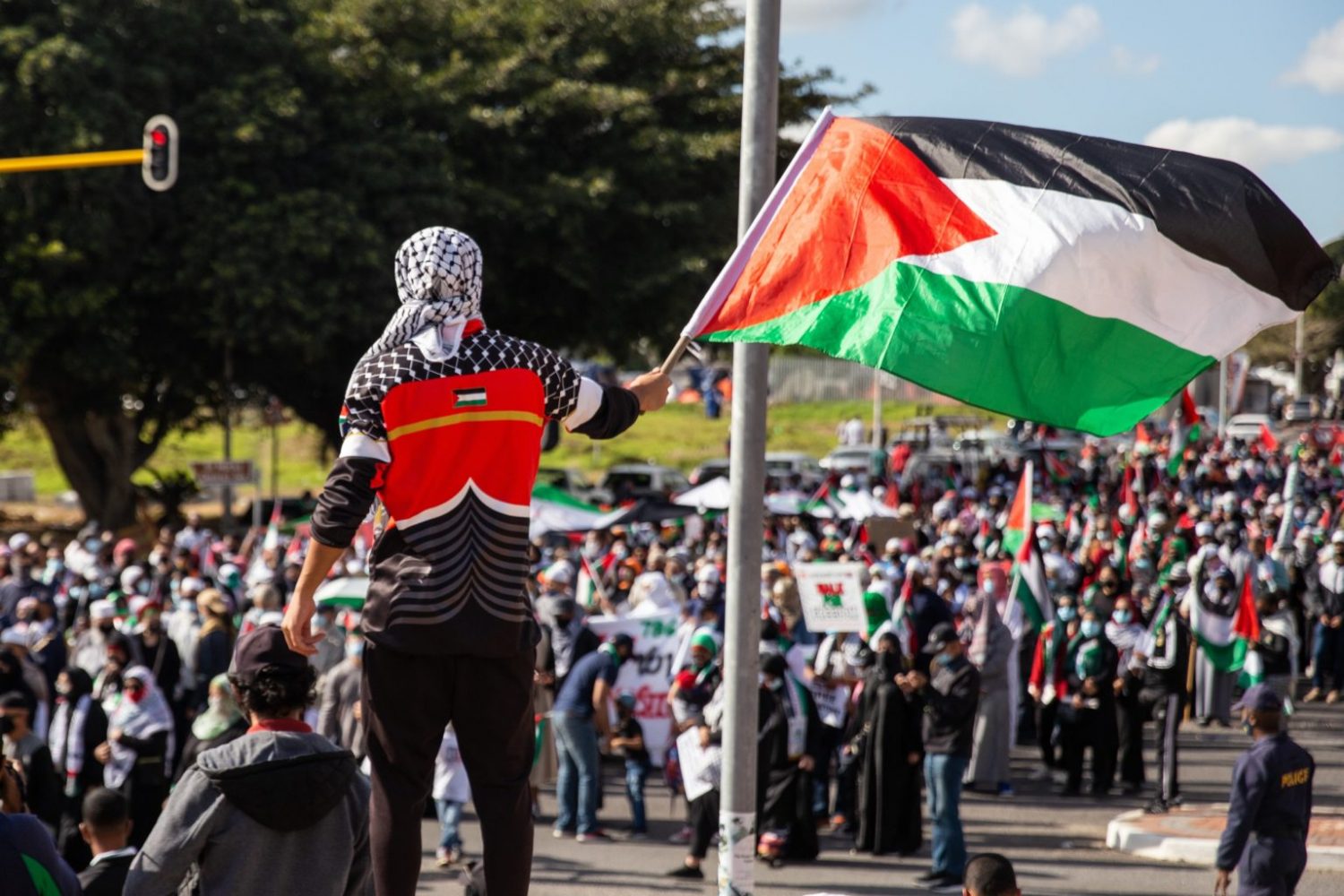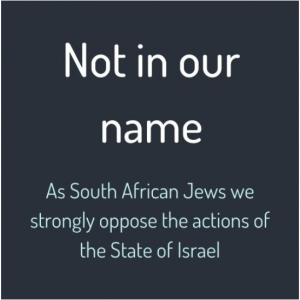Why should South Africans care about Israel’s apartheid?

JVL Introduction
This statement was produced by a variety of South African Jews brought together by hostility to the “unconditional support for Israel’s disproportionate violence” as expressed in a joint statement by the South African Jewish Board of Deputies (SAJBD) and the South African Zionist Federation (SAZF).
South African Jews – or at least some of them – played important roles in the struggle against apartheid while their supposed representative body, the SAJBD, could only bring itself to speak out against apartheid when it was safe to do so, in 1985.
Others were quicker off the mark, and many paid for their commitment in harsh ways, including suffering state repression, banishment and long terms in goal.
Some of them are among those now speaking out – again, as they did after the start of the second intifada – against the line that those who claim to speak for “the Jewish community” have taken.
This article was originally published by GroundUp on Fri 21 May 2021. Read the original here.
Why should South Africans care about Israel’s apartheid?
“We recognise apartheid when we see it” say South African Jews
Whenever Israel bombs Gaza, an event that seems to repeat every few years, the conflict inevitably finds its way into South Africa’s political discourse. Last week probably the biggest protest in a year in Cape Town took place: a call for South Africa to cut ties with Israel.
And this week, as has happened before when Israel attacked Gaza, a group of Jewish people has asked for signatories to a “Not in our name” statement. The statement, which the group will publish next week, condemns recent actions by Israel against Palestinians, and rejects the “unconditional support for Israel’s disproportionate violence” as expressed by the South African Jewish Board of Deputies (SAJBD) and the South African Zionist Federation (SAZF).
“These organisations neither represent us nor the diversity of Jews in this country,” it says.
The SAJBD describes itself as “the umbrella representative spokesbody and civil rights lobby of the SA Jewish community,” while the SAZF describes itself as looking after Israel’s image in South Africa and acting as “advocates for Israel”. On 11 May the SAJBD and SAZF published a joint statement calling on the South African government to be “even-handed” in its approach to matters concerning Israel and Palestine, in which the forced evictions in Sheik Jarrah are referred to as a “domestic land dispute in East Jerusalem”.
We asked Sonya Cotton, who was involved in drafting the petition, why South Africans are invested in this conflict many thousands of kilometres away.
Cotton told us that the petition was drafted by a diverse group of South African Jews coming together in “our shared horror at the atrocities committed in our name, and desire to reject the false and harmful dichotomy that sees Zionism and Judaism as interchangeable”.
“South Africans live in the aftermath of apartheid, so we recognise apartheid when we see it,” said Cotton, speaking in her personal capacity. “The Israeli government and Zionist organisations throughout the world spend tremendous amounts of effort trying to muddle the overwhelming evidence that Israel’s treatment of Palestinians is apartheid. As South Africans, speaking in support of Palestinian liberation in this way carries huge moral weight to the international community.”
In April 2021, international NGO Human Rights Watch found that the state of Israel is perpetrating “crimes against humanity of apartheid and persecution” against Palestinians.
The SAZF rejected the findings of this report, saying that it was “based on distortions, misinformation and political agendas”.
But in a world replete with state-led violence, discrimination and ethnic cleansing, what makes Israel different from China’s treatment of the Uyghurs, the ethnic cleansing of the Rohingya in Myanmar, or Iran’s treament of its Jewish population?
Cotton says that supporting Palestinian liberation does not mean that one ignores other atrocities committed by other states; in fact support for Palestinian rights, often coincides with support for other movements such as Black Lives Matter, gender justice, LGBT rights and opposition to anti-semitism.
Israel’s uniqueness and prominence in local politics, for Cotton, comes from its newness as a nation, formed in 1948, and its carefully developed image as a modern liberal democracy.
“The genocide and displacement of Israel’s creation is strongly etched into people’s living memories. So is the generational trauma of the Holocaust, which emboldens Zionists to oppress Palestinians,” said Cotton.
“In contrast to places such as China, Israel wants to be seen as a secular democracy based on Western standards of rule and law and reflecting the norms of the international community (such as supporting LGBT rights). Unlike many other examples of oppression, Israel uses the mechanisms of ‘democratic’ bureaucracy – such as its courts, its laws, etc – to perpetuate apartheid.”
Human rights abusers like Syria, Iran and North Korea are heavily sanctioned by the United States. By contrast Israel has over several decades been the US’s country’s largest recipient of aid. In many countries, including South Africa, there are active campaigns to raise money for Israel and promote tourism to it.
The close relationship between the SAJBD and SAZF is a source of tension for the authors of the petition. “While they claim to speak in our name, these organisations neither represent us nor the diversity of Jews in this country … Our Judaism is rooted in justice. Our culture and our history ground our unequivocal support of Palestinian freedom. Zionism is not Judaism. They should not be conflated, despite the efforts of the Israeli state,” states the petition.
Cotton told GroundUp that the SAJBD does not account for the diversity of views among South African Jews regarding Israel, recent Israeli actions, and condemnation of those actions.
“Why are our views neither protected nor represented?” asked Cotton. “As a fellow South African Jewish colleague asks: Is the SAJBD interested in Jewish South Africans or furthering Zionism?”
Cotton says that there is nothing contradictory about Jewish support for Palestinian liberation; rather, she says that her Jewish values compel her to oppose Israel’s discrimination against Palestinians.
“In Judaism, there is the tradition of Tikkun Olam, which literally means ‘repair of the world’. The concept recognises that Jews are responsible not only for our communities, but also for the wellbeing of all communities. Our families survived anti-semitism, including pogroms and the holocaust. We know what discrimination is like, so it is especially important that we stand up against the persecution of other communities, particularly that which is done in our name.
“There is no greater way to respect and remember our ancestors who were discriminated against for being Jewish than to work actively to create a pluralistic society based on total equality, interconnectedness and mutual understanding, rather than fear and segregation.”
As South African Jews we strongly oppose the actions of the State of Israel
As South African Jews, we are devastated and appalled at the recent (and ongoing) violence witnessed in Israel and Palestine, particularly when the vast majority of victims are oppressed Palestinian people. As South Africans, we are inspired by the struggle against Apartheid. We know all too well how important it is for diverse groups to show solidarity with the oppressed in the struggle for freedom. The impunity with which Israel disregards international law cannot be tolerated.
The State of Israel claims to speak in our name. It therefore becomes our moral and ethical duty to hold Israel accountable for the systemic oppression of Palestinians and demand equal rights for all.
We distance ourselves from South African Jewish organisations whose unconditional support for Israel’s disproportionate violence moves us ever further from a just resolution. We are a diverse group of Jewish South Africans, who are not represented by the South African Jewish Board of Deputies nor the South African Zionist Federation. Whilst they claim to speak in our name, these organisations neither represent us nor the diversity of Jews in this country.
As Jews with a range of religious (or secular) and cultural commitments, we are united in our desire to hold firm the Jewish value that every human being is invested with inherent dignity and every life is equal. Just as we resist anti-Semitism, we refuse to dehumanise Palestinians in order to make their deaths weigh lighter on our collective conscience. Our Judaism is rooted in justice. Our culture and our history ground our unequivocal support of Palestinian freedom. Zionism is not Judaism. They should not be conflated, despite the efforts of the Israeli state. We encourage Jewish communities, as well as others, to understand that distinction and actively speak out for justice and morality to oppose all levels of discrimination against Palestinians.
We mourn the deaths and maiming of all victims. Jewish Israelis, Palestinians in Gaza, the Occupied West Bank, East Jerusalem, and in Israel and foreign workers caught up in the violence. We emphasise the importance of understanding the historical and political complexities informing and inflaming the current events that are unfolding. Yet at the same time, in the words of Rabbi Lynn Gottlieb “…What is happening is the result of systemic violence embedded in an identity-based caste system supported and sustained by an enormous military investment by the US. Until that is fully understood and acted upon, violence will persist. Complexity does not remove accountability…”
We sign this statement in order to affirm the humanity of Palestinians and our own.
Here undersigned
** NOTE: Statement and names have been submitted to the press and will be published soon. This form will remain open as additional names can still be published online/social media. **

